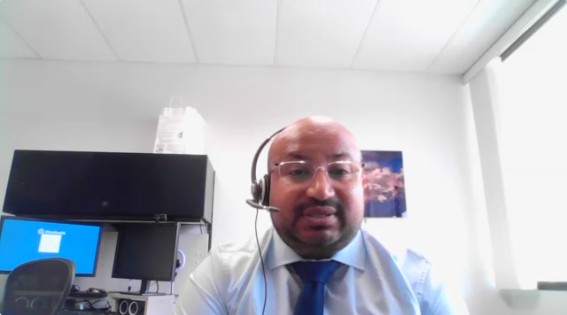“PTAB Acting Vice Chief Judge James Worth noted the revised interim review process includes no limits on the types of cases that can be delegated to the DRP, and the Director may specify issues for the DRP’s focus when delegating cases.”

Kalyan Deshpande
Last week, the U.S. Patent and Trademark Office (USPTO) hosted a webinar to discuss recent revisions to the interim process for Director review of America Invents Act (AIA) trial decisions by the Patent Trial and Appeal Board (PTAB). While the revised procedures include the delegation of the Director’s review authority to a pair of newly created panels, officials from the USPTO indicated that the Director’s discretion to review and opine upon issues in delegated cases meet the constitutional mandate laid out by the U.S. Supreme Court in U.S. v. Arthrex (2021).
USPTO Retires POP in Favor of Delegated Rehearing, Appeals Review Panels
The new Director review revisions began with a request for comments issued by the USPTO last July seeking public input on the process for Director review of PTAB final written decisions in AIA trials. On July 24 of this year, the Office officially implemented a revised interim Director review process that included the creation of two new review panels replacing the previous Precedential Opinion Panel (POP) process of Director review.
Discussing the revisions to USPTO Standard Operating Procedures (SOPs) governing the Director’s PTAB review authority was Kalyan Deshpande, Acting Deputy Chief Judge at the PTAB. The recent changes to SOP 2 have not impacted how the Office designates PTAB decisions as either precedential or informative, Deshpande said, including the public nomination process or recommendations from the Director’s Advisory Committee. However, comments submitted to the USPTO in response to the July 2022 RFC led to SOP 2 revisions that retired the POP in favor of two new panels, the Delegated Rehearing Panel (DRP) and the Appeals Review Panel (ARP). Deshpande discussed several suggestions included in the majority of public comments received by the USPTO, including the application of a de novo review standard for all issues and the establishment of a set time limit for Director review.
PTAB Lead Judge Jeffrey Abraham led the webinar’s discussion on the Director’s standard of review and other aspects of the revised interim review process. For both final written decisions and institution decisions, the latter of which are newly qualified for Director review requests, the Director reviews decisions for abuse of discretion. The Director can also provide de novo review of important issues of law or policy. While Director review of institution decisions are limited to those areas under the revised process, the Director may additionally perform de novo review of final written decisions for erroneous findings of material fact or erroneous conclusions of law.
Director’s Sua Sponte Review Authority Meets Constitutional Mandate Under Arthrex
The revised interim review process also specifies the Director’s sua sponte review authority, Abraham noted. Under the revised process, the Director must initiate sua sponte review within 21 days after the period for filing a request of rehearing, absent exceptional circumstances, and prior to the filing of a notice of appeal under 37 CFR § 90.3. Abraham cited interim Director review process statistics through July 1 of this year showing that 31 of 37 grants of Director review have been issued via sua sponte orders. Of the 232 total party requests for Director review, only 6 have resulted in grants of Director review. While Director review decisions are routine by default, Abraham added that the SOP 2 procedures were available for designating such decisions as either precedential or informative.
To streamline the decision-making process, party requests for Director review or sua sponte orders may be delegated by the Director to the DRP, a three-person panel selected from the PTAB’s Chief Judge, Deputy Chief Judge, Vice Chief Judges and Senior Lead Judge. As PTAB Acting Vice Chief Judge James Worth noted, the revised interim review process includes no limits on the types of cases that can be delegated to the DRP, and the Director may specify issues for the DRP’s focus when delegating cases. While the DRP has the authority to grant or deny rehearing requests, additional Director review is not available unless granted sua sponte.
Worth also discussed the revised review practices related to the ARP, which conducts review of decisions in ex parte, reexamination and reissue appeals. Composed of the Director, the Commissioner for Patents and the PTAB’s Chief Judge, the ARP issues decisions within three months of a panel convening. ARP review can only be ordered by the Director sua sponte and cannot be requested by parties.
At several points during the webinar, USPTO officials pointed to the Director’s retained sua sponte review authority as answering the constitutional mandate under Arthrex. Desphande in particular was responsive to questions on this point, noting that the Director’s sua sponte authority under the revised interim process meets the requirement from Arthrex that the Director have review authority over PTAB decisions, a conclusion reinforced by recent Federal Circuit decisions on the issue. Delegations of decision review to the DRP are made within the context of streamlining agency processes for sustainability, Deshpande added.

![[IPWatchdog Logo]](https://ipwatchdog.com/wp-content/themes/IPWatchdog%20-%202023/assets/images/temp/logo-small@2x.png)

![[Advertisement]](https://ipwatchdog.com/wp-content/uploads/2024/04/UnitedLex-May-2-2024-sidebar-700x500-1.jpg)
![[Advertisement]](https://ipwatchdog.com/wp-content/uploads/2024/04/Artificial-Intelligence-2024-REPLAY-sidebar-700x500-corrected.jpg)
![[Advertisement]](https://ipwatchdog.com/wp-content/uploads/2024/04/Patent-Litigation-Masters-2024-sidebar-700x500-1.jpg)

![[Advertisement]](https://ipwatchdog.com/wp-content/uploads/2021/12/WEBINAR-336-x-280-px.png)
![[Advertisement]](https://ipwatchdog.com/wp-content/uploads/2021/12/2021-Patent-Practice-on-Demand-recorded-Feb-2021-336-x-280.jpg)
![[Advertisement]](https://ipwatchdog.com/wp-content/uploads/2021/12/Ad-4-The-Invent-Patent-System™.png)






Join the Discussion
2 comments so far.
Pro Se
August 21, 2023 06:47 pmRemember kids:
When the USPTO introduce new rules, that means they’re covering up 3 they’ve broken.
Remember when the USPTO used to be about inventors and inventions?
Now, it’s nothing more than a revolving door of a bunch of lawyers on each side looking the other way and looking out for each other.
Trust me, the U.S. patent system you thought you knew is really a back door to the highest bidders.
Pro Say
August 21, 2023 05:39 pmBlah. Blah. Blah.
These changes constitute nothing more than a rearranging and repositioning of the guns on the innovation-killing USS PTAB.
If and until such time Congress sinks this out-of-control, doing-China’s-bidding battleship, nothing meaningful is going to change.
Nothing.